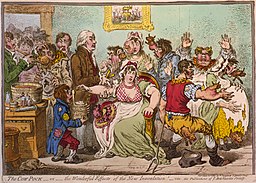History
Vaccinations
What Comes Around Goes Around
Tuesday, February 10, 2015
Or, as the author of Ecclesiastes put it,
That which has been is what will be,
That which is done is what will be done,
And there is nothing new under the sun.
Ecclesiastes 1:9 NKJV
Nowhere has that been more apparent of late than in the current controversy over vaccinations.
Here's a little history...
The theory that immunity to a disease could be achieved by exposing a patient to a weakened or lesser form of the disease isn't a new thought. As early as the 15th century, the Chinese began to practice "variolation"—blowing the dried, powdered scabs of an infected person's smallpox lesions into the nostrils—to prevent the spread of smallpox, one of the deadliest diseases known to man. Other methods, such as rubbing the infected fluid from an active lesion into a cut,were also practiced throughout Asia and Africa. Those who underwent variolation usually had a mild case of smallpox with less scarring and complications.
In 1717, Lady Mary Worley Montagu, an Englishwoman, witnessed the variolation procedure while in Constantinople. Montagu had lost her brother to smallpox, and was herself severely scarred by the disease. She had her 5-year-old son Edward variolated in 1718, and her 4-year-old daughter in 1721, after returning to England. Interest in the procedure grew.
By the time the practice came to America, objections to variolation had begun to arise. Religious objections, for the most part. Still, even the most religious groups couldn't argue with results, and the death rates from smallpox outbreaks were too high to ignore. In 1776 General George Washington ordered mandatory variolation for the entire Continental Army after a smallpox outbreak in Boston.
At the same time, doctors in England were experimenting with ways to improve the procedure. Dairy maids never seemed to contract smallpox, and Edward Jenner suspected their exposure to cowpox had made them immune. As cowpox was a mild disease in comparison, he began vaccinating patients with the cowpox virus, with good results. Widespread vaccination programs soon followed... but not without controversy.
The Vaccination Act of 1867 deemed smallpox vaccination mandatory for all children up to age 14, and included penalties for refusal, up to and including imprisonment. In 1885 in the town of Leicester, more than 80,000 people protested the mandatory vaccinations in an organized march, including an effigy of Jenner and a child's coffin. The Vaccination Act of 1898 repealed the penalties, and included an option for parents to opt-out of the vaccinations for their children if they so chose, for personal or religious reasons. While the protests were primarily about the "mandatory" aspect of the Act, there was a lot of fear that the use of the cowpox virus would cause the recipients of the vaccine to develop bovine-like symptoms... The following cartoon is from the late 1800s.
 |
| http://commons.wikimedia.org/wiki/File%3AThe_cow_pock.jpg |
America, following in Britain's footsteps, had their own debates and protests and Anti-Vaccination Leagues throughout the 19th and early 20th centuries. In fact, as each new vaccine was introduced, new protests sprang up around it. And in the last 20 years, every new study that comes out generates new furor about the safety and efficacy of vaccines, some pro and some con.
With the advent of the influenza vaccine (which is admittedly a hit-or-miss proposition in some years) the debate is renewed annually, and everyone's opinions get splattered all over social media again, right or wrong or indifferent. What I find interesting is that none of the arguments are new... even after more than two centuries of debating. The following political cartoon appeared in 1930.
 |
| http://i.imgur.com/BZQgGq0.jpg |
Knowing the history behind vaccinations (and the controversy they've engendered for several hundred years) certainly gives a bit of perspective. And with all the name-calling, fear-mongering, and inflammatory statements being made (by all sides) a little perspective can go a long way toward soothing ruffled feathers, calming fears, and hopefully, making the world a better and safer place for everyone.
Everyone has a responsibility to carefully consider their position for or against vaccination, and to be prepared to accept the possible consequences of their choices. Vaccination has inherent risks. So does non-vaccination. As is the case with every risky thing we undertake, from taking a bath to eating at McDonald's, do the benefits outweigh the risks?












0 Comments